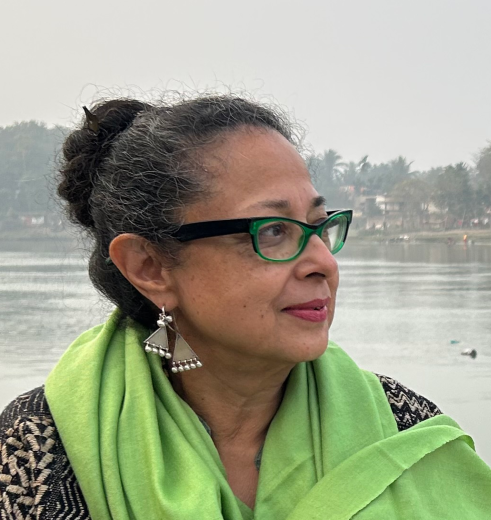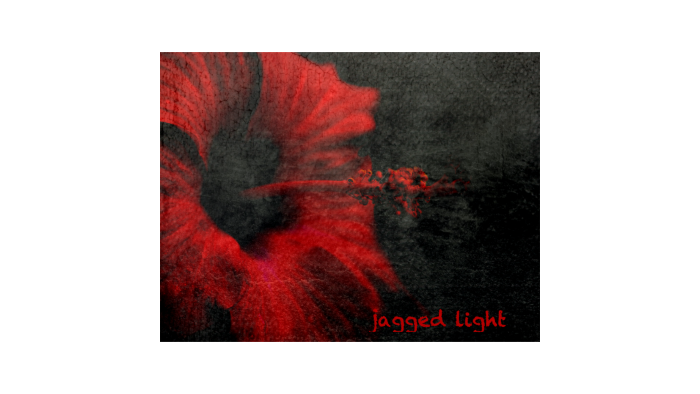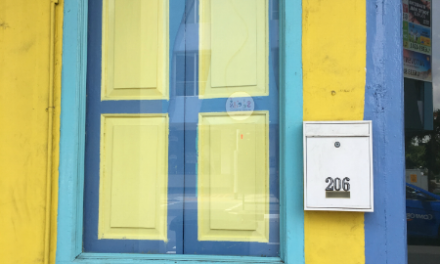Shorojabala combed her long dark tresses slowly. The Jaba Kusum Hair Oil that had come with the month’s groceries from Noni Mittir’s shop seemed to be not quite right. Were they adulterating even hair oil these days? Shoroja frowned and shook her head slightly, but continued to comb her hair with great care.
Thick, dark, almost jet black wavy hair fell to her hips from her perfectly symmetrical oval shaped head. Her neck was long, her back straight, she was considered tall for a woman, almost five feet six inches on Bhanu, her younger sister’s measuring tape. Her mother had worried they wouldn’t find a bridegroom for her eldest daughter when Shoi, the name by which everyone called Shorojabala at home, started shooting up around the time she was about ten years old.
Shoi’s father would hear every day how it was his side of the family that was to blame for this situation. Their genes, their “dhaat”. It was true that most men of the Bose family were tall by Bengali standards: Shoi’s grandfather stood a head above many a shaheb, the British men who were inevitably the bosses at the coal mine at Jamadoba where her father ran the company’s little hospital. However, the Bose women were not tainted by the tall gene, all nicely curbed at somewhere near five feet. The ideal height for a woman as far as Shoi’s mother was concerned.
Shoroja finished plaiting her hair and then twisted it up into a large khñopa – a chignon if you will but a khñopa (“n” soft and through the nose) is really that – at the nape of her neck and secured it with seven little black hair pins. Her mother in law liked her to wear the gold hair clips in a Chinese design and veil pins, ordered from Hamilton & Co., Calcutta’s well known jewellers, when Shoroja dressed up for social occasions or the outings with her at the strangest of hours. Yes, her mother in law had a peculiar disregard for what was deemed appropriate time. She refused to do things when others thought they ought to be done. For instance, a phaeton carriage ride by the Ganga river. Usually dusk to late evening, just before dinner, would be considered the perfect hour for this sort of thing. However, Shoroja couldn’t recall ever having gone out with Mamon at that time. More often than not, it was around midnight, in fact, that Kanonranjani Debi would suddenly demand that her daughters in law get ready in fine silks and veils and accompany her on a late night ride by the river or around Victoria Memorial, down Red Road. Of late, these outings had to be curtailed because of the War.
Shoroja adjusted the pallu of her pale yellow Tangail saree on her shoulder as she looked absentmindedly at the dusty mirror on the dressing table. The shingaras had turned out well. This year the cauliflowers were tender and fragrant and Boumon had chosen such succulent peas, she hadn’t even needed to add any sugar to the stuffing; just a little cumin, ginger, turmeric, and green chilli, and of course, asafoetida.
Almost a hundred shingaras were shaped and sat in neat rows on trays in the kitchen. She’d fry them the moment her husband came home. He loved shingaras made by her and would probably consume a quarter of them. Shoroja smiled. Today Omi would get to have as many shingaras as he wanted. She’d made sure there were more than enough.
Her mother’s fears had proven unfounded. By the time Shoi was eleven, almost a dozen enquiries had come for the beautiful elder daughter of Dr P C Bose. Shoi’s straight sharp nose, her high forehead, fine features and fair skin, of course her thick black hair, all were considered to be signs of great beauty; especially her fairness, it was described by a distant aunt of hers, who had learned English being an ICS officer’s wife, as like the magnolia flower’s… a gentle soothing pale white.
Shoi was too busy playing with her sisters Bhanu and Goyna to take notice of her own loveliness.
Her father had hoped to educate his daughters a little, there were girls’ schools opening in cities, and he was sure his three girls would benefit from formal lessons. His wife wouldn’t hear of it though. No one will marry your girls you understand, she’d say, if they go out, go to school, learn all those new-fangled things, that would be the end of everything and we’d be sitting till our old age with these girls unmarried and at home.
When Barrister Shourya Mohan Ghosh came to the colliery on some work and happened to see Shoi playing in the garden of her home, he had been charmed by her graceful demeanour and innocence. He went and met her parents without bothering to go through a matchmaker and proposed that she marry his second son who had just become an advocate.
Shoroja took a long breath without realising she had… everyone had been so happy. Not even a month had gone by from that visit by Baba to her parents and she was married, on her way to Calcutta, a city she had never been to. Twelve years old, her husband already twenty three.
Shoroja’s gaze strayed to the door, then to the open windows, the sun was about to set, where was Omi?
***
It was a familiar sensation, though Omi didn’t know what to call it. Every day as the sun began to set it descended on him. An uncanny discomfort, an alertness, a tremor building in his throat and pushing down. He could feel his heart beat faster. He needed to stop playing and go home, he needed to see his mother and he unconsciously always hoped he’d make it in time.
Omi started running even as Bagha and Bipin tried to pull him back.
“Ai, let’s play a little longer, Ma has said Mastermoshai will come late today!” Bagha said, “Chol na, Omi, let’s go steal some Jaba from Mongol Jetha’s house!”
Stealing flowers from Mongol Moshai’s garden, especially the beautiful large red hibiscus he was so proud of, was a favourite pastime of the three ten year olds, who had grown up in the same neighbourhood and were firm friends ever since they were toddlers. Bipin and Omi were in class five while Bagha, who did all he could to avoid books, was still in class three. His mother was sure this year too he’d remain right there. Every day after school, they met outside Noni Mittir’s grocery store tucked in a lane off Bokul Bagan Road – at one end of which Omi’s family’s sprawling home stood – and went over to the park at the back to play some cricket or football, or muck around in the sand pits at a construction site nearby.
Just beyond the site was the pukur, a small but deep pond with long insistent reed growing in it that pulled you down when you tried to swim. But that never deterred the boys, especially Omi. He’d jump into the water and swim from end to end, even when his feet got entangled in the reed and he could feel them dragging him down. He’d kick his legs swiftly, throw off the coils and race to the shore.
Now he was running fast… he had to get home.
It was almost a ten minute run on very fleet feet. In his hurry, he’d forgotten to wear his shoes. He realised half way through what had happened but there was no time to go back. No time at all.
***
They’d said she was unlucky. She’d never be able to give her husband and his family a child. A son. Boumon, her elder sister in law, had a son and a daughter already. But it was Shoroja’s duty to bear children too. Again Shoroja took a long breath, unknown to herself.
There had been three miscarriages. The doctors were mystified, her father in law was not one to take matters of health lightly, the best doctors had been consulted. Dr Suren Sen, the most well known physician in town, had suggested that she be allowed to change her environment when she conceived next… go away to some other place. Perhaps her parents’ home? For he could find nothing wrong with her, yet something obviously was not as it should be. Usually girls went to the parents’ home for the delivery of the first child, though not straight after conceiving, and her husband hadn’t liked the idea but his father had insisted.
Shoroja still smiled when she remembered how much her family had fussed over her when she arrived in the first month of her pregnancy. Especially Bhanu, who was as yet unmarried. And though her mother was not happy about norms being broken – What if their son in law missed Shoi so much that he took another wife or something, she’d asked archly of her husband – she was in fact delighted to have her eldest daughter home for a long spell after almost ten years. Every day, Shoi’s favourite dishes were made and no one was allowed to ask her to do any work. How many tangra maach she’d eaten then, all with lots and lots of roe… and it was during that time that she’d actually started reading the Mahabharat, Shoroja recalled.
She had given birth to Omi on a bright late winter morning, at home. It was a Monday, they said she was fortunate, that was Lord Shiva’s day… and just as she had been blessed with a wonderful husband, who had waited for her to have her child and not gone and married someone else in the meantime, she now had a beautiful son.
Yes, Omi was that, Shoroja smiled. He had her nose, her complexion, maybe he’d have her height? She’d never told anyone this, but she liked tall men, her husband was not short, but one couldn’t call him tall either.
“Kothay gele tumi!” Where have you gone?! A loud gruff male voice broke into her thoughts. Shoroja started. Without thinking, she reached for the cloth bound, well worn book, her Mahabharat, on the little mahogany table next to her bed and straightened it. Something entered her eyes, a wariness, not that she knew it.
“Shunchho!” You listening?!! Came another loud bellow. It was her husband. Shoroja started moving like an automaton toward the door, pulling her saree from around her shoulder at the back and covering her head. he was back. She had to fry the shingara.
But where was Omi?
“Stop wasting time in front of that mirror, do you hear? No virtue, no wisdom… useless woman… where are you?” The walls seemed to shake at the decibel of the voice. There was a self righteous, practically triumphant note of insult in it.
Shoroja could feel her ears go suddenly hot, her breath quicken, and her feet go heavy all at once. She must reach the kitchen and start frying the shingara. He loved them…
Loved… he loved… she felt something in her chest go blank. Soon that blankness reached her eyes. She must read about Draupadi and Karna again she thought, setting the large black cast iron kadai on the fire. Where was the ghee?
As she turned to pick up the jar of pure clarified butter that was made at home every week, she heard the rush of bare feet and then arms were going around her middle, someone was holding her tight, and a head was snuggling against her breast, she could hear a rush of breaths falling fast, their warmth on her chest.
Omi was home.
***
He shut his eyes shuddering. He hadn’t made it in time today… hadn’t. He had to find a way, he had to leave earlier and not let his friends hold him back. He had to reach home before that bleak dark feeling descended.
He could feel his mother’s hand stroking his hair, her hands were always cool. The sense of panic, of unease, ebbed slowly. When he looked up, she was smiling at him, and then with a finger on her lips, indicating he must not scream or talk loudly, she whispered, “Shingara khabi?”
Want to eat samosa?
His eyes widened in glee. He loved shingara, especially when Ma made them. Boumon made good ones too, but his mother’s were the best.
He smiled. His mother’s eyes glinted and she said, “Jota ichhe khaash aaj, bujhli?” Eat as many as you want today, understand?
“Shall I get some food or you’d rather see me dead!” her husband hollered.
Shorojabala started frying the perfectly shaped batch of triangular pastries.
***
Sricharaneshu Ma.
She stared at the letter in her hands, the scrawl of blue ink on it was almost illegible. Dear ma… Omi had written from England, sending his regards for Bijoya; his Bengali handwriting remained quite bad. It had taken almost three weeks for the letter to get to Calcutta. How far is this place, she wondered.
Omi used to study for hours sitting in the corner room of the outhouse attached to one end of their large home. The row of tiny rooms were meant to be used as storage space or when needed, as “antood”, the secluded room women had to retire to after giving birth. They had to be away from the daily routine of life for several days… Shoroja remembered her three visits there. After Omi, she’d had three children, all of them here in Calcutta. There had been no problems, no mishaps.
For some reason, as she felt the paper with his handwriting on it, she remembered one morning as he was about to leave for school, Omi had suddenly stopped, looked over his shoulder and said, “Ami kothao jabo na tomay chhere…” I won’t go anywhere deserting you, and before she could reply he’d scampered off. Shoroja had been nonplussed, why had he said that? He must have been about eleven or twelve then…
Everyone said he was such a bright boy, and now he was studying in some very well-known college in England, Shoroja wondered if he ate well. She hoped he didn’t think of her as much as she of him. Anyway, she oughtn’t complain, the other three children were here after all.
“I hope you are keeping well and Buri isn’t troubling you too much,” Buri was his sister’s pet name… how serious her twenty-two year old sounded, “Maybe some day you’ll come here, Ma,” really, was he mad, how would she go there? In a ship? And what would everyone say… eat with those people of another faith… her husband would… Shoroja felt her thoughts go still.
No, she was really a dimwit… just like her… her husband said. She folded the letter and put it inside the book lying next to her bed. There was a tight feeling in her chest. Last night he’d threatened he’d find another wife. He had said her family had duped him and gotten him married to their… she took a deep breath as her thoughts struggled… they’d saddled him with their idiot daughter, he had raged, and ugly too. Had she even seen herself!… so tall, like a man!… he was suffering because he was a good son and hadn’t disobeyed his father. She had heard all of this before, of course.
He’d then done what he always did. She’d lain quiet looking at the night above the half curtain of the windows. She couldn’t tell if it hurt any more.
Omi had had Boumon buy her and Buri a saree for Pujo. He had started earning a stipend he’d written. Shoroja went to the rack where she hung her sarees after wearing them. She quietly folded the pale cream saree with a pretty dark green border that Boumon had chosen for her, she knew her brother in law didn’t like Shoi Bou wearing bright colours. Shoroja had worn the saree the day before when they’d gone to hear “path”, prayers, at Mongol Moshai’s. The Jaba flowers on the bush outside the house were in full bloom as usual.
In the fading light, they seemed to look even more red.
***
It was around ten thirty in the morning and Shoroja was sitting on the bed combing her hair when she got the first wave of that unfamiliar choking feeling. Omi!
She looked around, disoriented. There was no one at home. Buri was visiting with her children but had walked over to her friend’s place next door; the maid had gone to get drinking water from the tubewell outside; the cook had stepped out to buy asafoetida from the new supermarket that had just opened, Noni Mittir’s shop had closed down quite a while ago after he passed on.
Shoroja had just had her bath and was getting ready to go to the prayer room. She no longer had the strength to stand before her dressing table mirror and get ready. So, after wearing her “thaan”, the plain white cotton saree without border or motifs that widows wore, she’d sit and comb her long hair… it was practically grey now; and her skin, though still fair, had grown sallow, it didn’t have the freshness to remind one of the magnolia any longer. Shoroja smiled to herself, so much talk about looks… beautiful, ugly… did it really matter? She still put Jaba Kusum Hair Oil every day though, she knew this oil was absolutely nothing like what they used to make using real red Jaba flowers back then, but she didn’t want to change, let a new name, a new shape of bottle, into her life.
No. There had been too many changes. Too many. Nearly seventy two now, she wondered if anything remained…
Again a tremor went through her. She could feel her fingers go numb, the comb fell from her hand. She lay back on the bed without thinking and stared up at the ceiling. Her hand reached out groping… she found her Mahabharat.
***
The news came that evening. She was lying in bed when Buri rushed into the room wailing. She didn’t hear what her daughter was howling and saying through her tears. She wondered instead if the asafoetida was of good quality… if the Jaba at Mongol Moshai’s were still as red… Omi liked to steal them.
Omi had gone to work in another city, that too was far away. In his last letter, he had told her she really shouldn’t have stopped eating fish after his father died, he was worried about how frail she’d become.
Omi. They had killed him.
Something hammered and tore in her chest, she tried to find the blankness. Where was it? Why wouldn’t it come?
Suddenly the room was full of people. Why were they all shouting and crying? Really, her husband was right, she was a dimwit… what was the commotion about?
Omi had grown tall, just the way she had hoped. And she knew he’d be waiting there when she reached. He had said he would never desert her, Yes, he had gone on ahead. Shorojabala closed her eyes.
……………………………………………………………………………………………………………………………………..
I hope you enjoyed reading the story of Shoroja and Omi; and the Bengali words didn’t get in the way. Shingara are samosas. Jaba, pronounced “Jawba,” is the hibiscus flower, it’s often used in prayers; Omi is pronounced “Awmee,” Bengalis are fond of giving pet names, that’s Shoroja’s son’s pet name. “Shunchho!” or “Are you listening?” is a way of calling out to your husband or wife… as even till quite recently, calling a spouse by name was not the custom. “Sricharaneshu” is the Bengali way of addressing an older person while writing a letter… literally, it means something like touching your feet or paying respects… so after Sricharaneshu, we put the name of the person we are writing to, in this case Omi is writing to his mother. “Moshai” is often added after the name of a gentleman, it’s an easier version of “Mahashay” which means sir/mister, even while referring to a person by his profession, let’s say, doctor, one might say, Doctormoshai or Daktarmoshai… here we have Mastermoshai as in the tutor and Mongol Moshai. “Pujo” is of course the most important Bengali festival of Durga Puja, it’s a practice to gift clothes to all at that time. Do let me know if you need any other explanations. The story starts out in the early 1940s and ends around forty years later. Omi is ten when it begins, his mother around thirty-two.
…………………………..





